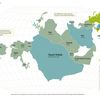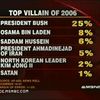14.8.2008 | 10:56
Upprifjun ... fortķšin leišir til nśtķmans enda okkur sagt aš pęla ekki ķ hinu lišna heldur horfa fram į veginn
- Ocalan's capture spells trouble for Caspian plans
- By Michael Lelyveld, Asia Times, 24 February 1999. Turkey's success in capturing the Kurdish separatist leader Abdullah Ocalan could mean more trouble for its plan to pipe petroleum from the Caspian Sea. The preferred pipeline routes from the Caspian carefully skirt Kurdish strongholds where Turkey has fought to exert its control. But the pipelines will still stretch across the borders of a volatile region.
- Gloomy picture overshadows oil bonanza
- By Michael Lelyveld, Asia Times, 8 May 1999. A dark picture of Caspian Sea development. Poverty, pollution and corruption in the midst of oil exploration and wealth for the privileged few.
- Caspian Sea oil a prize the U.S. wants to control
- By Tom Hundley, The Chicago Tribune, 25 November 1999. The leaders of Turkey, Georgia and Azerbaijan signed an agreement to build a new 1,080-mile pipeline that could carry a million barrels of oil a day from the Caspian Sea to the Mediterranean. The U.S. hails the pipeline as a major foreign policy triumph because Caspian oil will not have to flow through Russia or Iran to get to the oil-hungry markets of the West.
- Russia Aims At Caspian Sea Settlement
- By Sergei Blagov, IPS, 29 September 2000. Russia is urging the Caspian littoral states—including Azerbaijan, Iran, Kazakhstan and Turkmenistan—to reach agreements to protect bio-resources without waiting until the Caspian Sea is divided formally among them. The Caspian, the world's largest inland sea, is a focal point of an accelerating clash of interests among Russia, its newly independent neighbours and Iran—mainly because the 700 mile-long sea contains six separate hydrocarbon basins.
- Caspian pipeline skirts trouble spots
- By Bill Anderson, UPI, Tuesday 27 November 2001. The grand opening of a 900-mile pipeline that has thrown open the door to the vast oilfields of the volatile Caspian Sea region. The pipeline was built in a little more than a year by the Caspian Pipeline Consortium and links the huge Tenzig field of western Kazakhstan to the seaport of Novorossiysk.
- World Bank Pipeline in Georgia and Azerbaijan Illustrates Problems with Extractive Industries
- From CEE Bankwatch Network, Monday 27 May 2002. The issue of the harm which extractive industry projects have created in Central and Eastern Europe and Central Asia. The Baku-Supsa pipeline was the first fast-track component of the contract of the century, involving partial development of the Chirag oil field and related facilities in the Caspian Sea.
- New moves on Caucasus chessboard
- By Paul Goble, Asia Times, 21 April 1999. Several events in the southern Caucasus last week may lead to fundamental changes in power relationships not only there but across a much larger portion of the world as well. And because of that, some of the players both within the region and beyond appear to be positioning themselves to respond with new moves.
- A Discreet Deal in the Pipeline: Nato Mocked Those Who Claimed There was a Plan for Caspian Oil
- By George Monbiot, Guardian (London), Thursday 15 February 2001. During the 1999 Balkans war, some of the critics of Nato's intervention alleged that the western powers were seeking to secure a passage for oil from the Caspian sea. The Trans-Balkan pipeline, due for approval at the end of next month, is to secure a passage for oil from the Caspian sea.
- Iran, Azerbaijan face off as Caspian oil row turns nasty
- DAWN, Wednesday 25 July 2001. Iran and Azerbaijan refused to back down after an Iranian warship threatened an Azeri oil research vessel in disputed waters. This casts a shadow over the multi-billion-dollar development of the Caspian Sea's oil reserves with the participation of Western companies.
- Iranian Nation Determined to Protect Caspian Sea
- Tehran Times, 16 May 2002. President Khatami said that the Islamic Republic of Iran is against any kind of unilateral and inflammatory measure in the Caspian Sea. Iran is willing to continue logical negotiations to determine the legal regime of the Caspian Sea fairly so that all the Caspian littoral states would be fairly provided with Caspian resources.
- The empire isn'nt in Afghanistan for the oil!
- By Jared Israel, The Emperor's Clothes, 22 June 2002. The Anglo-US-German assault on Afghanistan was not for oil. The United States' main pursuit in Afghanistan is part of a geo-strategic concept. The U.S. strategy of promoting Turkey as a regional Imperial proxy force, strengthening its relations with Georgia and Azerbaijan with the goal of weakening Russian influence.
- Where Iran must draw the line
- By Kaveh L Afrasiabi, PhD, Akaveh1@aol.com, Asia Times, 31 October 2002. Iran's boundaries in the Caspian Sea is a hotly contested question that has been the subject of protracted negotiation since 1992, when officials of the Caspian littoral states—Russia, Azerbaijan, Kazakhstan, Iran and Turkmenistan—gathered in Tehran for the first time to tackle the outstanding issues of the so-called Caspian legal regime.
Um bloggiš
Baldur Fjölnisson
Nżjustu fęrslur
- Torfi Stefįns bannašur ęvilangt
- OL ķ skįk. Landinn malaši Kenķu ķ 9. umferš
- OL ķ skįk: Landinn ķ 88. sęti eftir 8 umferšir
- Mešaljónar ķ skįkinni
- Baggalśtur - Sagan af Jesśsi
- Eitraš fyrir lżšnum?
- Óvenjulega döpur taflmennska innfęddra einkennir Reyjavķkursk...
- U.S. Rushes Coolant to Japanese Nuke Plant After Earthquake
Heimsóknir
Flettingar
- Ķ dag (18.9.): 0
- Sl. sólarhring: 1
- Sl. viku: 8
- Frį upphafi: 0
Annaš
- Innlit ķ dag: 0
- Innlit sl. viku: 7
- Gestir ķ dag: 0
- IP-tölur ķ dag: 0
Uppfęrt į 3 mķn. fresti.
Skżringar
Bloggvinir
-
 Agný
Agný
-
 Alfreð Símonarson
Alfreð Símonarson
-
 Andrea J. Ólafsdóttir
Andrea J. Ólafsdóttir
-
 Bjarni Harðarson
Bjarni Harðarson
-
 Bjarni Kjartansson
Bjarni Kjartansson
-
 Björgvin Gunnarsson
Björgvin Gunnarsson
-
 Brynjar Jóhannsson
Brynjar Jóhannsson
-
 FLÓTTAMAÐURINN
FLÓTTAMAÐURINN
-
 Eygló Þóra Harðardóttir
Eygló Þóra Harðardóttir
-
 FreedomFries
FreedomFries
-
 Fríða Eyland
Fríða Eyland
-
 Félag um stafrænt frelsi á Íslandi
Félag um stafrænt frelsi á Íslandi
-
 Georg P Sveinbjörnsson
Georg P Sveinbjörnsson
-
 Gestur Guðjónsson
Gestur Guðjónsson
-
 Gils N. Eggerz
Gils N. Eggerz
-
 Gullvagninn
Gullvagninn
-
 Gunnar Skúli Ármannsson
Gunnar Skúli Ármannsson
-
 Guðrún María Óskarsdóttir.
Guðrún María Óskarsdóttir.
-
 Gísli Hjálmar
Gísli Hjálmar
-
 Hagbarður
Hagbarður
-
 Halla Rut
Halla Rut
-
 Haraldur Haraldsson
Haraldur Haraldsson
-
 Hilmar Kári Hallbjörnsson
Hilmar Kári Hallbjörnsson
-
 Hlekkur
Hlekkur
-
 Ingibjörg Álfrós Björnsdóttir
Ingibjörg Álfrós Björnsdóttir
-
 Jens Guð
Jens Guð
-
 Jóhannes Ragnarsson
Jóhannes Ragnarsson
-
 Jón Aðalsteinn Jónsson
Jón Aðalsteinn Jónsson
-
 Jón Ragnarsson
Jón Ragnarsson
-
 Jón Steinar Ragnarsson
Jón Steinar Ragnarsson
-
 Jónína Benediktsdóttir
Jónína Benediktsdóttir
-
 Karl Tómasson
Karl Tómasson
-
 Kári Magnússon
Kári Magnússon
-
 Loopman
Loopman
-
 Magnús Þór Hafsteinsson
Magnús Þór Hafsteinsson
-
 Promotor Fidei
Promotor Fidei
-
 Rúnar Sveinbjörnsson
Rúnar Sveinbjörnsson
-
 Salvör Kristjana Gissurardóttir
Salvör Kristjana Gissurardóttir
-
 Sandra María Sigurðardóttir
Sandra María Sigurðardóttir
-
 SeeingRed
SeeingRed
-
 Sigurbjörn Friðriksson
Sigurbjörn Friðriksson
-
 Sigurjón Þórðarson
Sigurjón Þórðarson
-
 Sigurður Þórðarson
Sigurður Þórðarson
-
 Snorri Hrafn Guðmundsson
Snorri Hrafn Guðmundsson
-
 el-Toro
el-Toro
-
 Sveinn Ingi Lýðsson
Sveinn Ingi Lýðsson
-
 Tryggvi Hjaltason
Tryggvi Hjaltason
-
 TómasHa
TómasHa
-
 Túrilla
Túrilla
-
 Upprétti Apinn
Upprétti Apinn
-
 gudni.is
gudni.is
-
 haraldurhar
haraldurhar
-
 proletariat
proletariat
-
 Ívar Pálsson
Ívar Pálsson
-
 Ómar Ragnarsson
Ómar Ragnarsson
-
 Ónefnd
Ónefnd
-
 Óskar
Óskar
-
 Óskar Helgi Helgason
Óskar Helgi Helgason
-
 Óskar Þ. G. Eiríksson
Óskar Þ. G. Eiríksson
-
 Þórir Kjartansson
Þórir Kjartansson
-
 Arnar Guðmundsson
Arnar Guðmundsson
-
 Bara Steini
Bara Steini
-
 Birgir R.
Birgir R.
-
 Birgir Rúnar Sæmundsson
Birgir Rúnar Sæmundsson
-
 brahim
brahim
-
 Brosveitan - Pétur Reynisson
Brosveitan - Pétur Reynisson
-
 Bwahahaha...
Bwahahaha...
-
 Dingli
Dingli
-
 eysi
eysi
-
 Gestur Kristmundsson
Gestur Kristmundsson
-
 Guðbjörg Elín Heiðarsdóttir
Guðbjörg Elín Heiðarsdóttir
-
 Gunnar Helgi Eysteinsson
Gunnar Helgi Eysteinsson
-
 Gunnar Rögnvaldsson
Gunnar Rögnvaldsson
-
 Helgi Jóhann Hauksson
Helgi Jóhann Hauksson
-
 Hlini Melsteð Jóngeirsson
Hlini Melsteð Jóngeirsson
-
 Jakobína Ingunn Ólafsdóttir
Jakobína Ingunn Ólafsdóttir
-
 Katrín Snæhólm Baldursdóttir
Katrín Snæhólm Baldursdóttir
-
 kreppukallinn
kreppukallinn
-
 Kristín Magdalena Ágústsdóttir
Kristín Magdalena Ágústsdóttir
-
 Máni Ragnar Svansson
Máni Ragnar Svansson
-
 Morgunblaðið
Morgunblaðið
-
 Neo
Neo
-
 Orgar
Orgar
-
 Ragnar L Benediktsson
Ragnar L Benediktsson
-
 Rauði Oktober
Rauði Oktober
-
 Skákfélagið Goðinn
Skákfélagið Goðinn
-
 Sveinn Þór Hrafnsson
Sveinn Þór Hrafnsson
-
 Vilhjálmur Árnason
Vilhjálmur Árnason
-
 Þór Ludwig Stiefel TORA
Þór Ludwig Stiefel TORA




Bęta viš athugasemd [Innskrįning]
Ekki er lengur hęgt aš skrifa athugasemdir viš fęrsluna, žar sem tķmamörk į athugasemdir eru lišin.